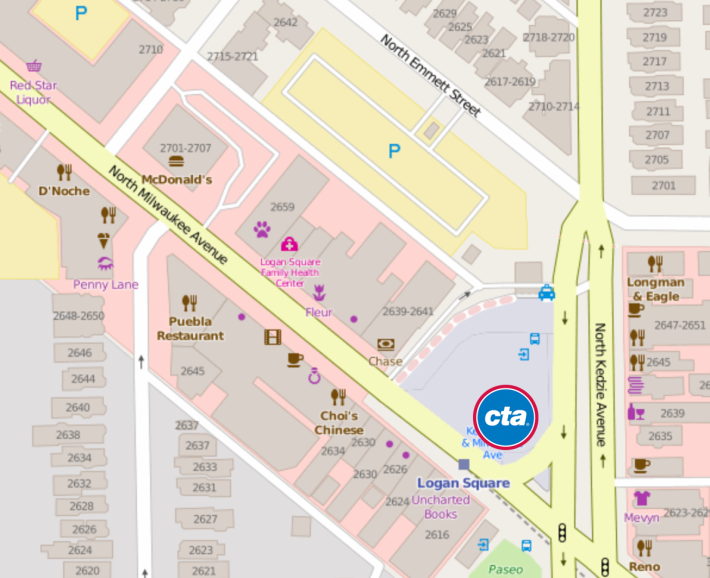A parking lot next to the Logan Square Blue Line station that's ripe for redevelopment is under review for a zoning change. 35th Ward alder Carlos Ramirez-Rosa intends to change the zoning district from a very low-density, mixed-use B1-1 designation to RT-4, a residential district designation. That type of zoning allows only single-family homes and two-flats.
Rodrigo Anzures-Oyorzabal, the 35th Ward's legislative and policy director, said that the proposed zoning change is in response to input from community groups who feel that zoning districts in the ward should be changed to be consistent. The prevailing zoning district on Emmett Street, on the north side of the parking lot, is RT-4, although many of the buildings don't conform to this because they have more units than the current designation allows. The RT-4 zone makes it ineligible for parking minimum reductions that the TOD ordinance allows.
The zoning change doesn't move the parking lot any further along to being developed, and conflicts with recommendations from a series of charrettes that gathered input from nearby residents on what they would like to see on the land, currently used for car storage.
Anzures-Oyorzabal said that while no community group contacted the office specifically about the parking lot, "we know this lot is going to be important to many people," adding that the zoning consistency change isn't unique to this lot.
Rosa ended up deferring the zoning change discussion at this week's meeting because the Chicago Department of Planning and Development (DPD) said they needed more time to review the zoning change's potential effect on the city's contract with LAZ Parking to manage and maintain the parking lot. LAZ also manages the city's pay-and-display parking meters.
DPD has multiple options for pursuing private development on city-owned land. They can issue a request for proposals from developers, stating specific guidelines for the type of land use they would like to see. Ideally the development prerequisites in the RFP would be shaped by the alder and residents.
DPD can also sell the land via a closed bidding process. Anzures-Oyorzabal said he believes DPD is actively creating an RFP for this parking lot, but the department hasn't yet responded to my questions about the subject. Whether the land is sold via an RFP or closed bidding, the sale must also be approved by the Chicago Plan Commission.
Maintaining low-density zoning on a land parcel is a common tactic by alders to force developers to seek their approval in order to build more than one or two housing units on a land parcel. However, that can sometimes result in the developer choosing to build single-family home or two-flats rather than seeking a zoning change for higher density.
In fall 2014 previous 35th Ward alder Rey Colón invited the Metropolitan Planning Council to hold three public input sessions to create a vision for the train station and parking lot. Anzures-Oyorzabal said Rosa "participated in the MPC [charrettes] as a constituent."

Anzures-Oyorzabal said his office has heard from ward residents that the charrettes "did not satisfy the desires of our communities."
"We have heard from stakeholders, many of whom have different interests [including transit-oriented development, affordable housing, and green space], that the sort of development discussed at the [charrettes] was not reflective of their desires," Anzures-Oyorzabal added. He said Ramirez-Rosa is looking for a new process that will ensure that all of these considerations are taken into account in the redevelopment of the Emmett Street lot.
Daniel La Spata, a board member with the Logan Square Neighborhood Association, argues that the MPC planners presented a limited formula for how to finance development at this location. He says that guided participants into development concepts that are much denser and market-rate focused than LSNA would like to see at this location. "There are many tools that a developer could utilize to create a 100-percent affordable development, particular since this is city-owned land in a [tax-increment financing] district and [Chicago Housing Authority] opportunity area."
MPC's report said most of the charrette participants wanted affordable housing, saying they wanted between 50 and 100 percent of units designated as affordable. MPC recommended that it be required for a development to designated at least 50 percent of the units as affordable. The report stated, "Of the proposals participants created during the second workshop, 37 percent included no affordable housing, 30 percent included all affordable housing, and 33 percent included a mix of affordable and market-rate units."
Ramirez-Rosa has created a new "community driven zoning and development process." A document on his website describes what a property owner must do in order to get a zoning change, zoning variance, or special use permit.
The property owner or developer would be partnered with a pre-designated neighbor-led organization to have a hearing, with written notices given neighbors within 750 feet. The city's zoning code also requires that property owners within 250 feet receive a mailed notice. Ramirez-Rosa will use the organization's input to decide whether to approve the requested change.
MPC spokesperson Mandy Burrell said that with new leadership in the ward office, and continuing housing pressure in Logan Square, it makes sense to have additional community input on the redevelopment of the parking lot. However, she added that the charrettes and the final report "captured the full range of what people who attended the meetings said."
Burrell added that people provided feedback online and via text message. "[MPC] really strived to capture the sentiment of the residents and worked with locals to turn out folks," she said. "We stand by our report, but neighborhood issues evolve and if they want to take a fresh look at that, we want to be supportive."
Anzures-Oyorzabal said there are currently no plans for the Emmett Street parking lot, but that making the zoning districts consistent in the ward just happened to start with the lot. "The downzoning is not reflective of any pre-development of the lot and we have no timeline for the sale and development of the lot," he said.






